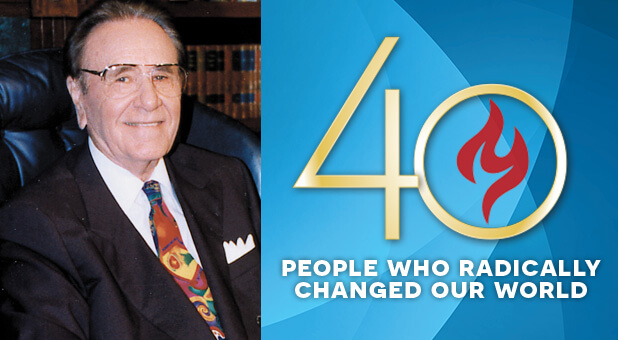Born in impoverished circumstances in southern Oklahoma, Oral Roberts’ miraculous healing as a teen would serve as a precursor to the ministry that made him one of the premier evangelists of the 20th century.
It happened en route to a meeting where the 17-year-old Roberts was healed of both stuttering and tuberculosis through the ministry of unknown evangelist George W. Moncey. “Son, I am going to heal you, and you are to take My healing power to your generation,” said a voice young Oral recognized as God’s. “You are to build Me a university and build it on My authority and the Holy Spirit.”
That is exactly what happened. Roberts went on to preach to millions and lay hands on 1.5 million people for healing. When he died in December 2009, Roberts had written more than 120 books, pioneered television evangelism, and spread the doctrine of seed faith that is an integral part of Pentecostal and charismatic circles.
A larger-than-life figure whose slicked-back dark hair and flamboyant preaching inspired many evangelists, Roberts lives on through televised and recorded messages that continue to impact the world. He also left a mark through his family, which included four children and a marriage of 66 years to his wife, Evelyn, who died four years before Oral.
Roberts’ legacy extends far beyond the pulpit, through the educational institution that he established in 1965 in Tulsa, Oklahoma. He served as president of Oral Roberts University for 28 years and remained as chancellor and a lifetime trustee after retiring in 1993.
Today the school spans 263 acres and last year enrolled more than 3,400 students in more than 65 undergraduate majors, 14 graduate and two doctoral programs. More than 40,000 alumni of Oral Roberts University are implementing his vision of touching every corner of the world with the gospel.
Current ORU president William Wilson got a firsthand look at Roberts’ influence during his stint as executive officer for the Azusa Street Centennial. The historic 2006 event brought 50,000 people to Los Angeles from across the globe. “I discovered quickly in that journey that of all the people in this movement—and there were a lot, from William Seymour on—that if there was a person who embodied the movement more than any one individual, it was Oral Roberts,” Wilson says.
Darren Rodgers, director of the Flower Pentecostal Heritage Center, calls Roberts one of the most influential American healing evangelists of the 1950s and ’60s, one who bore a mark of integrity at a time when many others fell into scandal. In addition, Roberts reached beyond his Pentecostal roots to expand a then-budding charismatic movement by bringing independent evangelists, churches and schools together.
“Unlike other evangelists, he was able to unite people around a common vision,” Rodgers says. “Many shared his vision for healing, evangelization and education. Before Oral Roberts and people like him, there was not a large platform for independent charismatics or Pentecostals.”
While some criticized Roberts for naming a university after himself, the historian says that as an expert marketer Oral recognized that many people supported him. Thus, Roberts wanted to parlay that personal goodwill into development of larger institutions. Rodgers says he succeeded, with ORU one of the premier Christian universities in the nation because of its founder’s vision.
“Oral was always a global man, a global leader,” Wilson says. “His ministry went around the world. In this season, where ORU has gotten strong again and emerged from crisis, we are positioned to dream again. We’re capturing the initial impulse of what Oral heard—that God would use this educational institution to the uttermost bounds of the earth.”
In reflecting on Roberts’ legacy during ORU’s 50th anniversary year, the president says several points emerged. Particularly how Roberts shaped a fresh view of God as a loving God who wants to bless and heal people instead of a then-common view of a harsh, retributive Lord. In addition to the concept of seed faith and serving as a bridge between the charismatic and Pentecostal communities, Wilson sees Roberts’ most enduring contribution as bringing education to the forefront of Christian life.
“He said you could not only be anointed to be a preacher, but you could be anointed to be a doctor, a lawyer, a teacher, a nurse or an engineer,” Wilson says. “He taught that in every discipline you could be anointed by God’s Spirit, hear God and do God’s work in whatever sphere God sent you into.
“Oral’s founding vision ended with something like: ‘Their vision will exceed yours and I will be well-pleased.’ That is true. In raising this institution, Oral also helped educate the Spirit-filled movement that education was good and God could use it for kingdom purposes.”














































